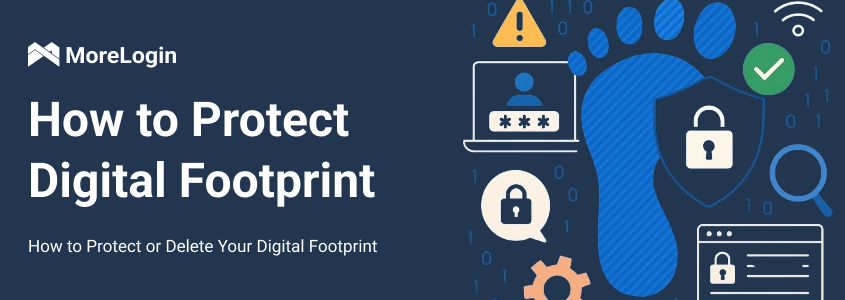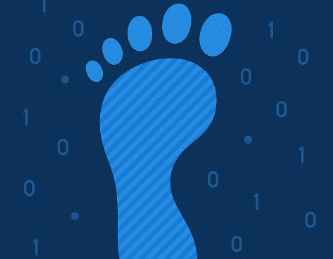
- Product

- Pricing
- Affiliate Program
- Use Cases
- Resource


Almost everyone's life is inseparable from the internet, but have you ever considered that every action you take online leaves a digital footprint? These traces are called digital footprints. For example, your posts to Moments, your "likes," your purchases, your search history, and even your location information can all be collected and used by others.
Protecting or cleaning up your digital footprint is actually protecting yourself. This article, based on the latest developments in 2025, will provide you with several practical methods to help you better manage and protect your digital footprint.
A digital footprint is every trace you leave online. Whether you actively leave it or someone else or a system silently collects it behind the scenes, it counts. For example, posting a status on social media, uploading a photo, or commenting on someone else's post counts as active, as you're fully aware that you're posting information.
It can also be collected unconsciously. For example, your browser and the website you visit record your browsing history and click patterns. Even the length of time you spend online and the device you use to access the internet are recorded. Often, you're unaware that this data is being collected, but it all adds up to a very detailed digital footprint.
Others can easily piece together your interests, family situation, and even financial status. Hackers can use leaked information to steal your identity and apply for credit cards or loans. While convenient, businesses can target ads based on your browsing history, which means you have virtually no privacy.

What can we do to protect ourselves? Actually, the method is not complicated. We just need to be more careful when we use the Internet.
Most people skip setting permissions when signing up for social media accounts or installing apps. For example, on Facebook, Instagram, or TikTok, you'll set your updates to only visible to friends and disable search engine indexing of your profile.
Open your phone's settings and review which apps have access to your microphone, camera, and location. Ask yourself, does this app really need these permissions?
Many apps share data with third-party advertisers by default. Taking a few minutes to disable these settings can significantly reduce the potential for tracking.
Use Privacy Tools
VPNs: VPNs can hide your real IP address, making it harder for others to track where you're browsing the internet. However, free ones come with risks.
Ad blockers & anti-tracking tools: Plugins like uBlock Origin and Privacy Badger can block most ads and tracking scripts.
Secure browsers: Browsers like Brave or Firefox with privacy plugins are more secure than the default Chrome browser.
Safe search engines: Use DuckDuckGo or Startpage instead of Google; they don't save your search history or tag you.
Anti-detection browsers: Your online fingerprint isn't just your IP address; your device itself leaves a fingerprint. For example, your operating system, resolution, fonts, time zone, and hardware information are all part of your fingerprint. Many websites use this combination to track you. You can use an anti-detection browser like Morelogin or a cloud phone. These will unify or disguise these parameters.

Clear cookies and cache regularly. Cookies are small files that websites place on your computer during browsing to remember you. However, many advertisers also use them to track your behavior across websites. This can be done in your browser settings, or you can install automatic clearing plugins like Cookie AutoDelete.
Avoid entering sensitive information on unsecured websites. Many phishing websites look identical to legitimate ones, making it easy to accidentally enter your email address, password, or even bank card information. Always check that the URL begins with "https://" instead of "http://."
Register using a disposable email address or a virtual phone number. If you're signing up for less important services, it's recommended not to use your primary email address or phone number. Instead, use a disposable email address (such as Temp-Mail or SimpleLogin) or a virtual phone number (such as Google Voice or a code-receiving platform) to avoid unwanted advertising or information leaks.
The seemingly harmless information you post on social media, such as your school, company, birthday, family relationships, and pet names, can be used as answers to common password questions. Others can use this information to hack into your account or reset your password.
Avoid excessive disclosure of personal details. Posting flight tickets, tracking your current location, or taking photos of your home address or license plate can be exploited. Some social media platforms include location information by default; remember to disable it manually. Avoid publicly posting photos and information about your children.
It's nearly impossible to completely erase all online information about you. But you can certainly reduce its size and visibility.
Delete old accounts you no longer use. Use tools like JustDeleteMe or AccountKiller to find deregistration methods for various platforms. Search your email for keywords like "Welcome to," "Thanks for signing up," and "Successful registration" to find services you've previously registered with.
Clean up your search engine presence. Search Google for your name, email address, or old usernames to see what results appear. If you find pages containing your personal information, you can use Google's removal request tool to request that Google remove the content.
Clear your browsing history and activity data. Regularly delete your browser history, cache, cookies, and autofill data. If you use a Google account, go to Google My Activity to view your search history, video history, usage history, and more, and delete them in bulk. Turn off activity syncing to prevent future activity from being recorded.
When registering a new account, use an anonymous or alias name, and don't link it to your primary email address. Avoid filling out unnecessary information, such as birthday, address, gender, and phone number. Sometimes, leaving it blank or writing "None" will not affect usage. Set old content on social platforms to be visible only to yourself, or use bulk deletion tools (such as TweetDelete, Jumbo, etc.) to clear out old content.
Many people think, since I'm not a public figure, I shouldn't worry too much about this. Here are a few very practical reasons.
Every piece of information you leave online—what you search, what ads you click, where you dine—is recorded and analyzed by platforms, piecing together a complete picture of who you are. If this data is misused, such as being sold to third parties or leaked, you have no control over what happens.
Many companies and schools review resumes by searching a candidate's social media accounts, postings, and even checking for inappropriate online comments. Everything you post can become a basis for others to judge you. This isn't to say you can't express your opinions, but you need to be clear about whether you're willing to take responsibility for this information.
Your birthday, alma mater, pet's name, and email habits may sound insignificant. But when combined, these details can become tools for password guessing, phishing emails, and even scam calls. Hackers don't always rely on technical means; sometimes, simply gathering information is enough to breach your account's defenses.
While we can't completely erase our online presence, our digital footprint can be controlled, managed, and minimized. From adjusting privacy settings and using anti-tracking tools to being cautious with your comments and regularly deleting old accounts, these seemingly small actions can significantly reduce risk in the long run.
Want to more thoroughly hide your browser fingerprint, manage multiple accounts, and prevent tracking? Try MoreLogin, an anti-detection browser designed specifically for privacy.
More information:
1. https://en.wikipedia.org/wiki/Digital_footprint
2. https://www.youtube.com/watch?v=cprsK9uoYjk